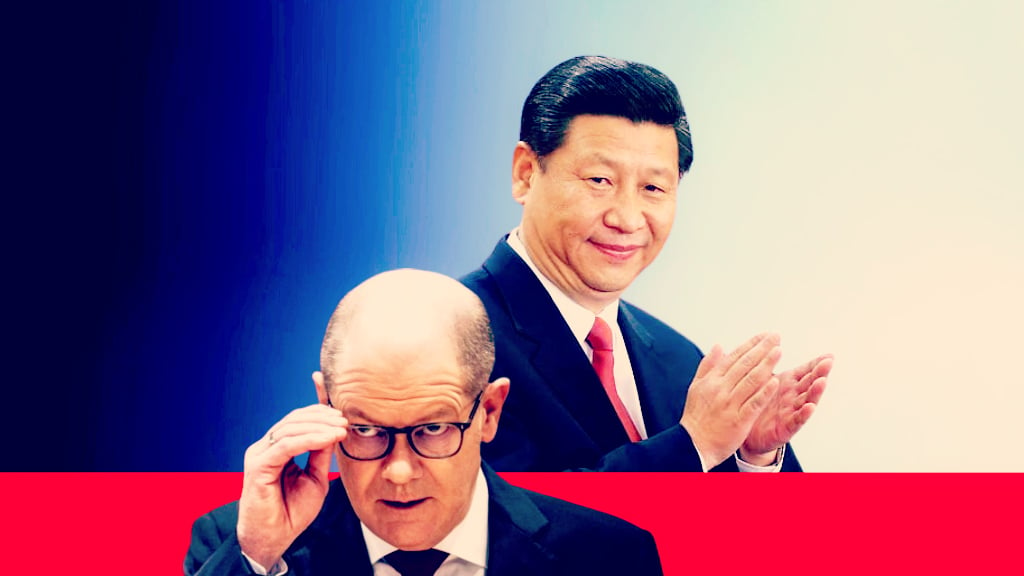Politics
Unpopular Scholz Goes to China: Trade War and Ukraine War Collide

Chancellor Olaf Scholz, the least popular German leader in many decades, has just made his longest bilateral foreign visit since he came to power, to China.
The Chinese did their usual humbling of an adversarial Foreign Leader by sending the deputy mayor of Chongqing – not even the mayor himself – to meet him, in a clear sign of contempt.
Scholz visit had a mixture of economic pragmatism with the old and frankly tired Ukrainian lobby.
Scholz was accompanied on his trip by senior German executives, including from Mercedes-Benz and BMW, in a demonstration of the importance that the Chinese market holds to Europe’s largest economy.
But while he lobbied for better market access for German firms in China, the talks with Chinese President Xi Jinping contained the inevitable call for the Chinese to exert pressure on Russia to withdraw its forces from Ukraine.
The three-day tour of China is the first visit since Berlin agreed a ‘de-risking’ China strategy, outlining the need to reduce dependencies on Chinese goods.
Reuters reported:
“Scholz, who met for more than three hours with Xi, before later seeing Premier Li Qiang, said he had pressed the case for China to guarantee German firms equal market access, the protection of intellectual property and a reliable legal system.
‘I expressed my concern … that unilateral economic policy decisions in China are creating major structural difficulties for companies in Germany and Europe’, he said, noting he hoped this would quickly lead to practical solutions.”
On the thorny issue of the EU anti-subsidy investigations against China, Scholz said the bloc should not act out of protectionist self-interest but competition should be fair.
“Xi showed little willingness to make concessions, saying Chinese green tech exports have “not only enriched global supply and alleviated inflationary pressure, but also contributed greatly to the response to climate change”.
‘(Germany and China) should be vigilant against rising protectionism’, Xi said.”
Xi believes China and Germany have ‘huge potential’ for cooperation both in manufacturing and emerging fields sych as ‘green transformation’ and digital artificial intelligence.
China has also – according to the Chancellor – lifted restrictions on imports of beef and apples from Germany, Scholz said.
“Regarding Russia’s two-year-old full-scale invasion of Ukraine, Scholz said he asked Xi ‘to exert pressure on Russia so that (President Vladimir) Putin finally calls off his insane campaign, withdraws his troops and ends this terrible war’.”
Xi dismissed the peace summit in Switzerland requested by Ukrainian President Volodymyr Zelensky, and scheduled for June – that Russia has made clear it will not attend.
Scholz also said he had discussed at length with Xi the supply of dual-use goods to Russia.
Some other outlets were more transparent about the tense aspect of the meeting between the leaders, with Politico saying that Scholz ‘got a slap’ from Xi Jinping.
Politico reported:
“Despite the state media’s portrayal of a friendly setting — featuring tea and a walk with the Chinese president — Beijing’s grievances over Europe’s looming war on green tech were obvious during his meeting with the leader of the largest EU economy.
[…] He told Scholz, who was in China for a four-day visit, that “the two sides should beware of the rise of protectionism,” and hinted that Berlin should not go down the path of de-risking, as there’s no risk whatsoever in the bilateral ties.
Stressing that Beijing ‘is not a security threat’, Xi said Chinese-German cooperation should not be construed as a risk.
‘Be it traditional fields such as machine manufacturing and automobiles, or new areas like green transition, digitalization or Artificial Intelligence, the two countries have huge potential for win-win cooperation yet to be explored’, Xi said, according to state media Xinhua.”
Read more:
Ultra-Globalist European Union Is Covering Up for Liberal Polish PM Tusk’s Illegal Actions – Hungarian MEPs File Official Protest With European Commission
Read the full article here


















